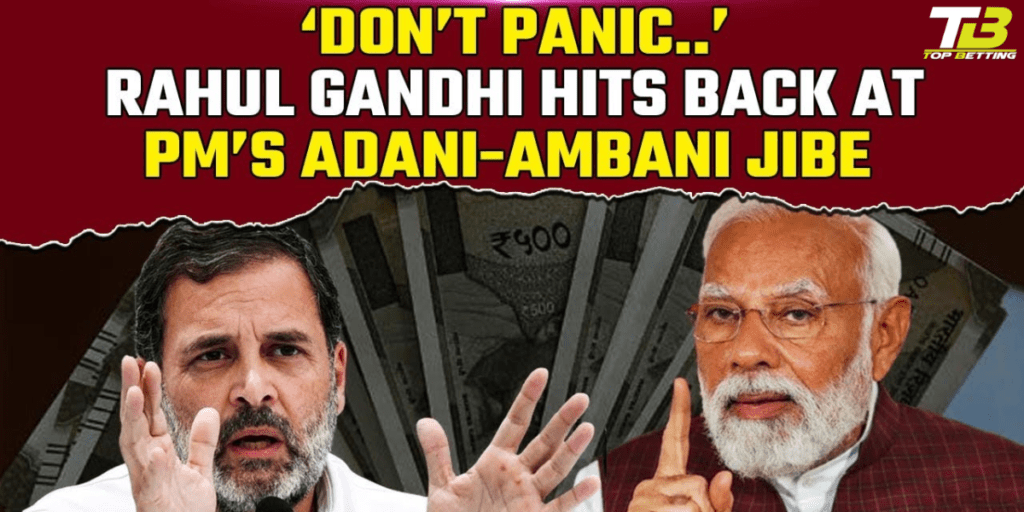
Rahul Gandhi hits back at Modi and Adani-Ambani
The ongoing Lok Sabha elections in India have seen a heated exchange between Prime Minister Narendra Modi and Congress leader Rahul Gandhi, with the former taking a jibe at the latter’s stance on industrialists Gautam Adani and Mukesh Ambani. In a recent campaign rally, PM Modi questioned why Rahul Gandhi had stopped “abusing” these two business tycoons, insinuating that the Congress party may have received money from them. This prompted a sharp retort from Rahul Gandhi, who accused the Prime Minister of having personal experience in the matter of “money in a tempo” from Adani and Ambani.
PM Modi’s Allegations Against Rahul Gandhi
During his election rally in Telangana’s Karimpur, Prime Minister Narendra Modi launched a scathing attack on Rahul Gandhi, questioning the Congress leader’s sudden change in stance towards Gautam Adani and Mukesh Ambani. Modi stated that for five years, the “Congress’s Shehzada” (a reference to Rahul Gandhi) had repeatedly targeted these industrialists, but once the elections were announced, the attacks abruptly stopped.
The Prime Minister went on to ask the Telangana crowd whether “tempo loads of notes (currency)” had reached the Congress party, implying that some sort of deal had been made between the party and the businessmen. Modi further questioned, “You abused them for five years, and then it stopped overnight? Zaroor daal mein kuch kaala hai (there is something fishy).”
Rahul Gandhi’s Scathing Response
Rahul Gandhi did not hold back in his response to Prime Minister Modi’s accusations. In a video message, the Congress leader directly addressed the Prime Minister, asking if he was “a little scared” and if his comments about Adani and Ambani were based on his “personal experience.”
Gandhi pointed out that normally, Modi would talk about the industrialists behind closed doors, but for the first time, he had mentioned them publicly. He then challenged the Prime Minister, saying, “Do one thing – send the CBI, ED to them and carry out a thorough investigation and don’t be scared.”
Rahul Gandhi further claimed that the money that PM Modi has allegedly “given” to Adani and Ambani, the Congress will give the same amount to the people of India through various schemes if the party is voted to power.
The Ongoing Accusations and Counteraccusations
The exchange between Rahul Gandhi and Prime Minister Modi has intensified the political rhetoric in the run-up to the Lok Sabha elections. The Congress has long accused the Modi government of favoring the top industrialists in the country, including Gautam Adani and Mukesh Ambani.
In response to PM Modi’s statement, AICC general secretary Jairam Ramesh also targeted the Prime Minister, saying that he is bewildered as he is not getting a clear majority and is now attacking “his own friends.”
Earlier, Congress leader Priyanka Gandhi Vadra had also commented on the matter, stating that in the third phase of the elections, “the people of the country have slowed down the tempo of Modi ji” and that he is now “missing the tempo of his friends.”
The Bigger Picture: Allegations of Crony Capitalism
The ongoing tussle between Rahul Gandhi and Prime Minister Modi over the Adani-Ambani issue is part of a larger narrative surrounding allegations of crony capitalism and the perceived closeness between the government and certain business conglomerates.
The Congress party has long accused the Modi administration of favoring a select few industrialists, including Gautam Adani and Mukesh Ambani, at the expense of the common people. This narrative has gained traction, particularly in the aftermath of the Adani Group’s meteoric rise and the perceived preferential treatment it has received from the government.
Adani-Ambani: The Centerpiece of Political Attacks
Gautam Adani and Mukesh Ambani have become the centerpiece of political attacks, with the opposition parties, particularly the Congress, accusing the Modi government of facilitating the growth of these business empires at the cost of public interest.
The Congress has repeatedly alleged that the government has awarded lucrative contracts and projects to the Adani Group, while also turning a blind eye to the group’s alleged financial irregularities. Similarly, the party has accused the government of favoring Mukesh Ambani’s Reliance Industries in various sectors, including the telecom and energy industries.
The Allegations of Quid Pro Quo
At the heart of the ongoing political tussle is the allegation of a quid pro quo arrangement between the government and the Adani-Ambani business groups. The opposition parties, led by the Congress, have claimed that these industrialists have provided financial support to the ruling BJP in exchange for favorable policies and decisions.
Rahul Gandhi’s latest response to PM Modi’s comments can be seen as an attempt to further amplify this narrative, suggesting that the government’s perceived closeness to the Adani-Ambani duo is not just a matter of political rhetoric, but potentially a deeper issue of corruption and cronyism.
The Demand for Investigations
In his response to PM Modi’s allegations, Rahul Gandhi has challenged the government to initiate a thorough investigation into the dealings between the government and the Adani-Ambani groups. This demand for a comprehensive probe is aimed at lending credibility to the opposition’s claims of crony capitalism and potential wrongdoing.
The Congress leader’s call for the CBI and ED (Enforcement Directorate) to investigate the matter underscores the party’s belief that an impartial inquiry could uncover evidence of impropriety or undue influence peddling.
The Political Implications
The ongoing war of words between Rahul Gandhi and Prime Minister Modi over the Adani-Ambani issue has significant political implications. The opposition’s relentless attacks on the government’s perceived favoritism towards these business conglomerates have the potential to sway public opinion, especially among the segments of the population that have been affected by the economic policies of the current administration.
Moreover, the demand for a thorough investigation could put the government on the defensive, forcing it to either comply with the request or risk being perceived as shielding the influential industrialists.
The Role of the Media and Public Discourse
The media’s coverage of the Adani-Ambani controversy and the political battles surrounding it has also played a crucial role in shaping public discourse. The extensive reporting and analysis of the allegations and counteraccusations have brought the issue into the national spotlight, further fueling the political debate.
The public discourse surrounding the Adani-Ambani issue has also highlighted the broader concerns about the influence of big business on the political decision-making process. This has led to a heightened scrutiny of the government’s policies and the perceived nexus between the political establishment and the corporate elite.
The Broader Implications for Indian Democracy
The ongoing tussle between Rahul Gandhi and Prime Minister Modi over the Adani-Ambani issue transcends the immediate political arena. It raises fundamental questions about the health of Indian democracy and the role of powerful business interests in the political process.
The allegations of crony capitalism and the perceived collusion between the government and select industrialists have the potential to erode public trust in the democratic institutions and the fairness of the political system. This, in turn, could have far-reaching consequences for the country’s long-term social and economic stability.

Conclusion
The Adani-Ambani controversy has become a defining feature of the ongoing Lok Sabha elections, with both the ruling party and the opposition using it as a political weapon to gain an edge. The exchange between Rahul Gandhi and Prime Minister Modi has further intensified the debate, with both sides accusing the other of being in cahoots with the influential business groups.
Regardless of the immediate political outcomes, the Adani-Ambani issue has broader implications for the state of Indian democracy and the public’s faith in the fairness of the political system. The demand for a thorough investigation and the ongoing public discourse surrounding the matter will continue to shape the political landscape in the days and weeks to come.











